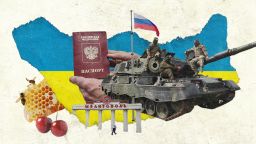Russia is forcing Ukrainians in Russian-occupied territories to accept Russian citizenship by engaging in a systematic push “to make it impossible for residents to survive in their homes” unless they do so, according to a newly released report from the Yale Humanitarian Research Lab.
The report details an extensive campaign of both laws from the Kremlin to “streamline applying for a Russian passport while simultaneously threatening those who refuse to apply with detention or deportation,” as well as de-facto restrictions on those who refuse to accept the passports.
The restrictions “include denial of medical services, social benefits, the ability to drive and to work, and overt threats of violence and intimidation,” said the report, which was released Wednesday and produced as a part of the US State Department-backed Conflict Observatory.
The violations detailed in the report “are classic war crimes in the sense that they are restricting or limiting through this process people’s ability to access critical services and resources that Russia is required to allow all people to access, such as healthcare, and humanitarian systems,” Yale Humanitarian Research Lab’s Nathaniel Raymond told CNN Wednesday.
“The second part here is that this is a unique and specific dynamic of the broader campaign by Russia to erase Ukrainian national identity and Ukrainian sovereign state existence,” he said.
Yale’s Humanitarian Research Lab has done extensive work looking into Russia’s alleged war crimes, including its program of forced deportation of Ukrainian children – a crime for which the International Criminal Court issued an arrest warrant against Russian President Vladimir Putin.
“Now that we are able to share with International Criminal Court, we hope that the information about forced Russian nationalization will assist both ICC and Office of Prosecutor General (OPG) Ukraine with leads and evidence they have, that this may be a link in other investigations we don’t even know about,” Raymond told CNN.
Russian officials are instituting the forced passportization efforts in occupied Luhansk, Donetsk, Kherson and Zaporizhzhya regions. The United States does not recognize any of the occupied territories in Ukraine as belonging to Moscow.
According to one of the researchers who compiled the report, when residents in these areas are pressured into accepting Russian citizenship, they are also “strongly encouraged” to renounce their Ukrainian citizenship, and those with municipal or public jobs are required to do so.
Many of the policies described in the report can be traced to the Russian federal government, researchers said, with one noting that Putin “is clearly deeply involved in this.”
In April, Putin signed a law forcing residents in those occupied regions to accept or refuse Russian citizenship by July 1, 2024. Those who arrived after Russia’s annexation of those territories – which is believed to be a small population – must decide even earlier, by January 1, 2024. Those who do not accept citizenship by those dates will be considered “foreign citizens and stateless persons,” and may be subject to detention or deportation to unspecified locations, according to the report.
Beyond the laws, officials in the occupied territory have instituted official and unofficial policies to force residents to accept Russian citizenship.
“Russia’s occupation forces in Ukraine have made access to certain medicine and medical care conditional on accepting Russian citizenship. These restrictions force vulnerable persons (including residents who are elderly, have chronic medical problems, have disabilities, or have low income) to decide between accepting Russian citizenship and forgoing medical care, especially when they are unable to leave the occupied areas,” the report describes.
Access to social services has been restricted against those who do not accept Russian citizenship, a move that particularly affects parents, as it leaves them “ineligible for benefits to support their children.”
“Parents who accept Russian citizenship can receive at least 8,591 rubles per month for 18 months,” the report notes.
“Russia’s occupation administrations have also made access to a variety of critical municipal services,” including drivers licenses, vehicle registration and even access to the electrical grid, “impossible without Russian citizenship.”
According to the report, Russian officials also allegedly sought to take specific advantage of the chaos following the destruction of the Nova Kakhovka dam in early June to force residents to accept Russian citizenship, making recovery aid contingent on citizenship and targeting evacuees from the disaster.







